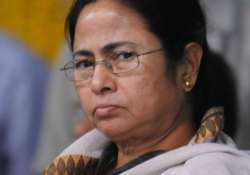Strong response to hills shutdown, GJM cautions Mamata
Darjeeling, July 30: A Gorkha Janmukti Morcha-sponsored 72-hour shutdown to press for a Gorkhaland state Monday evoked strong response in West Bengal's Darjeeling hills with markets and educational institutions remaining shut and minimal vehicular movement.Police

Darjeeling, July 30: A Gorkha Janmukti Morcha-sponsored 72-hour shutdown to press for a Gorkhaland state Monday evoked strong response in West Bengal's Darjeeling hills with markets and educational institutions remaining shut and minimal vehicular movement.
Police described the shutdown as peaceful amid reports of stray incidents and arrests of over 50 Gorkha Janmukti Morcha (GJM) activists. The GJM has called the shutdown renewing its agitation for the separate Gorkhaland to be carved out of parts of Darjeeling and Jalpaiguri districts of northern West Bengal.
Darjeeling's Superintendent of Police Kunal Agarwal said a few vehicles were set afire by goons while more than 50 GJM activists were arrested for picketing.
He said tourists stranded in the region due to the shutdown were escorted by police to out of the region.
Meanwhile, GJM chief Bimal Gurung has said that the Mamata Banerjee-led state government would attempt to "violently crush" the movement.
"She (Banerjee) is a person who indulges in the politics of violence. We are fully aware that she will unleash her police on us. The security personnel will fire on us. Even I might get killed, but the demand for Gorkhaland should not die. The voice for Gorkhaland will never subside," he said.
The shutdown coincides with the Congress-led central government's reported decision to form a separate state of Telangana by splitting up Andhra Pradesh.
The Gorkhaland movement has left many dead over the past two decades besides affecting the region's economy -- tea, timber and tourism.
On July 18, 2011, a tripartite agreement was signed between the GJM and the state and central governments for setting up a Gorkhaland Territorial Administration (GTA), an autonomous and elected hill council armed with more powers than its predecessor -- the Darjeeling Gorkha Hill Council formed in the late 1980s.
The GJM now runs the Gorkhaland Territorial Administration after sweeping its maiden elections held in July 2012.
Police described the shutdown as peaceful amid reports of stray incidents and arrests of over 50 Gorkha Janmukti Morcha (GJM) activists. The GJM has called the shutdown renewing its agitation for the separate Gorkhaland to be carved out of parts of Darjeeling and Jalpaiguri districts of northern West Bengal.
Darjeeling's Superintendent of Police Kunal Agarwal said a few vehicles were set afire by goons while more than 50 GJM activists were arrested for picketing.
He said tourists stranded in the region due to the shutdown were escorted by police to out of the region.
Meanwhile, GJM chief Bimal Gurung has said that the Mamata Banerjee-led state government would attempt to "violently crush" the movement.
"She (Banerjee) is a person who indulges in the politics of violence. We are fully aware that she will unleash her police on us. The security personnel will fire on us. Even I might get killed, but the demand for Gorkhaland should not die. The voice for Gorkhaland will never subside," he said.
The shutdown coincides with the Congress-led central government's reported decision to form a separate state of Telangana by splitting up Andhra Pradesh.
The Gorkhaland movement has left many dead over the past two decades besides affecting the region's economy -- tea, timber and tourism.
On July 18, 2011, a tripartite agreement was signed between the GJM and the state and central governments for setting up a Gorkhaland Territorial Administration (GTA), an autonomous and elected hill council armed with more powers than its predecessor -- the Darjeeling Gorkha Hill Council formed in the late 1980s.
The GJM now runs the Gorkhaland Territorial Administration after sweeping its maiden elections held in July 2012.